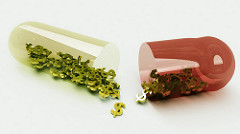
Recently approved Hepatitis C drugs present an opportunity that pharmaceutical companies simply can’t afford to ignore. A disease caused by the hepatitis C virus, infection of which can be both acute and chronic, ranges in severity from a mild illness that lasts a few weeks to a serious, lifelong ailment.
WHO estimates that 130–150 million people globally have chronic hepatitis C infection and Japan has the highest incident rate in industrialized countries with an estimated 1.5-2 million patients.
In December 2013, when the FDA approved Gilead Sciences’ Sovaldi (sofosbuvir), it was a blessing for Hepatitis C patients since the drug provided unparalleled efficacy in a much shorter time than conventional treatments.
Gilead’s ‘Sovaldi Tax’
However, Gilead’s decision to list Sovaldi at a price of more than $1,000 a day, created a public outcry by health insurers, patient groups and lawmakers who considered the price unjustifiable and referred to it as the ‘Sovaldi tax’.
It wasn’t surprising that when Abbvie, which generated $12.5 billion in 2014 sales from the world’s best-selling drug Humira, got approval for their hepatitis C treatment, that battle lines really got drawn.
The leading pharmacy benefit manager (PBM) in the United States, Express Scripts, decided not to reimburse Sovaldi or Gilead’s combination drug, Harvoni (sofosbuvir and lepidasvir). Instead, Express Scripts struck an exclusive deal with AbbVie, who offered their product, Viekira Pak(ombitasvir, paritaprevir and ritonavir tablets co-packaged with dasabuvir tablets) at a significant discount.
As Express Scripts has an estimated 27% market share of prescription claims processed in the United States, it seemed like dark clouds ahead for Gilead.
Mega, mega-blockbuster sales
However, if sales is an effective criteria to measure the success of a drug, the Gilead hepatitis C franchise with $18 billion dollars in sales, in the last twelve months, has emerged as an outright winner.
In all likelihood, when the final numbers come in, Harvoni’s sales in 2015 should upstage AbbVie’s Humira and make Harvoni the best-selling drug in the world.
|
Sovaldi |
Harvoni |
|
|
Q4 2014 |
||
|
Q1 2015 |
||
|
Q2 2015 |
||
|
Q3 2015 |
||
|
Total Sales |
$5,461 |
$12,626 |
|
Combined Total |
$18,087 |
|
Double trouble for AbbVie
Losing the crown of owning the best-selling drug in the world isn’t AbbVie’s only problem. Last week, AbbVie suffered a severe setback as the FDA issued a safety warning on Viekira Pak. The FDA warned that, “hepatitis C treatments Viekira Pak and Technivie can cause serious liver injury” in some patients.
Even without the FDA warning, Harvoni’s ease of use has been a primary driver for it to become the treatment of choice. Unlike Sovaldi which has to be used with ribavirin and peginterferon alfa, most patients only need one pill every day of Harvoni.
Express Scripts reimbursed, Viekira Pak, on the other hand, requires patients to take four pills each day.
While Gilead is yet to reach an agreement with Express Scripts, they have started winning back some accounts. Prescription records from Medicare show Gilead’s products are already being prescribed 35 times more than those of Abbvie and with the recent safety warning, the gap should only widen.
Our View
With cure rates in excess of 90% these hepatitis C treatment drugs are revolutionary. Given the effectiveness of the treatment and size of the patient populations, there is a hardly a pharmaceutical company in the world, innovator or generic, who isn’t looking for a piece of the action.
However, since development timelines are long and investments required significantly large, it is important to keep monitoring the landscape so that the right products can be developed.
The world does need safe and effective Hepatitis C drugs.
The PharmaCompass Newsletter – Sign Up, Stay Ahead
Feedback, help us to improve. Click here
Image Credit : High priced medication by Bill Brooks is licensed under CC BY 2.0
“ The article is based on the information available in public and which the author believes to be true. The author is not disseminating any information, which the author believes or knows, is confidential or in conflict with the privacy of any person. The views expressed or information supplied through this article is mere opinion and observation of the author. The author does not intend to defame, insult or, cause loss or damage to anyone, in any manner, through this article.”







